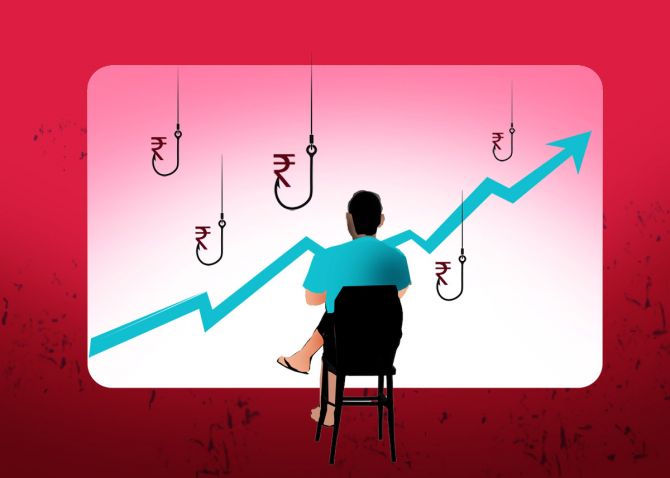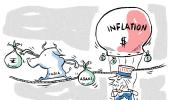'Very few small investors stay invested for those three or four or five years.'
'If there's like a six month, one-year period when the market is not doing well, you exit.'
'After the market has run up, you get in again.'
This way you will never make returns.'

When Devina Mehra, the chairperson, managing director and founder of First Global, speaks out her mind on the aspects of investing that makes her a successful investor and portfolio manager, and which most small investors ignore -- risk management, position sizing, capital protection, human emotions, systems -- one listens awestruck.
In this three-part exclusive interview, Devina Mehra speaks to Prasanna D Zore/Rediff.com at length about some of the most crucial investing lessons, systems, and rules that defines her investment philosophy and offered her evergreen gems on investing wisdom.
The First Global India Super 50 PMS scheme has generated a total return of 108 per cent or risk-adjusted return of 1.52 compared to the benchmark Nifty 50, (61.2 per cent) for the three year period 2020-2023.
How did you generate such huge returns? What gives you that cutting edge?
This was April-end figures; as of May we are at 117 per cent. Our Smallcase portfolio -- in which we have been around for less time -- is up 36 per cent as against the benchmark being up 18 per cent.
When you mention the risk-adjusted returns, the performance is not coming out of anyone's whims or fancies; it is coming out of a system, what we call our Human Plus Machine (HPM) system.
The base of HPM is an artificial intelligence (AI) and machine learning (ML) system which we code and then there is some amount of human expertise that is applied on top of that, including the fact that we actually put a lot of emphasis on risk management.
We say (tell our clients) that more than half the fees you pay are for risk management because in investment the key thing is to prevent the big drawdown, to prevent big losses and only then you can compound.
We always err on the side of caution. We have a very diversified portfolio, very liquid names and yet we are able to generate these returns because that's the way the system (HPM) is supposed to work.
In fact, it would be interesting to know that we actually had the PMS (portfolio management services) license from 2000 and we launched a product only 20 years later simply because we wanted a system which had some consistency, some replicability, before taking other people's money.
It's a big fiduciary responsibility to take someone's hard earned money. I did not want to do it on an ad hoc basis. So now we do it very systematically and the results show that.
Does the HPM system give First Global PMS the edge that helps it generate better alpha compared to its peers?
That is what gives you some predictability. Also, especially on the risk-adjusted returns, it is coming out of a system and we have very diversified holding. \
We call our equity scheme India Super 50 because we hold roughly around 50 securities at any given point in time. It is again a myth to say that you need a very concentrated portfolio to give returns.
Investing is a game of luck and skill. A concentrated portfolio basically leaves you to the whims and fancies of the luck. If you have the skills, you should have a diversified portfolio because that gives you predictability.
If you are sure you are going to be right 65 per cent of the time, and if you have only ten or 15 stocks (a concentrated portfolio), then that 65 per cent ratio will not hold. But when you have 50-60 stocks (a diversified portfolio), then that 65 per cent ratio holds.
If you actually know that your system works, then you should be diversified. Otherwise you're just playing luck.
There might be a six-month period where you might do very well also in a concentrated portfolio. But that's risky.
Since you talked about the drawdown, what kind of drawdown did you face? Because as soon small investors see a little bit of drawdown in their portfolio, they become a bit jittery.
Let me answer this in two bits. Our risk management is our focus. So there were two big stress tests that (we undertook) come to my mind.
For example, in March 2020, very soon after we started, there was the big COVID crash. I actually tweeted on March 2, 2020, that something very strange is happening in the world because Italy and Japan had shut down schools and for the first time you saw these tourist attractions in Rome with not a soul in sight.
Later on, we got used to those visuals, but that was the very first time. That was when we went totally risk averse in terms of more cash, more hedges.
In our multi asset products, we went to non-equity -- India and globally -- and with a result that we actually had very low drawdowns of only around 10 per cent when everybody else was down 35 40 per cent.
The other big stress test was the day the Russia Ukraine war broke. Nifty went down 5 per cent we were down 1.6 per cent. That is where risk management helps.
To answer the other question about small investors getting jittery because there is some drawdown or no returns for a period in time (which compels small investors to get jittery and withdraw money) then you will never get good equity returns.
I did this piece (external link) on a book that has come out on Rakesh Jhunjhunwala (The Big Bull Of Dalal Street: How Rakesh Jhunjhunwala Made His Fortune authored by Neil Borate, Aprajita Sharma and Aditya Kondawar), and the book talks about many things.
What stood out for me was that Rakesh saying, 'I made money in 1989 to 1992; I made money in 2003 to 2007. But there were also five year periods when I didn't make money.'
That is the reality of the equity markets: Returns can be lumpy. They will not come like a fixed deposit (steady returns): you will see 15-16 per cent compounded (returns in equity) every year over a very long period only (if you stay invested).
But if you get out every time things are not doing very well, you will miss out on the up move. I also believe that everybody must realise the risk of being invested in the market -- that there can be a drawdown -- but there is also a risk in not being invested.
Being very data driven we did this exercise that since the Sensex started, if you had put in Rs 100, last year (in 2022) it would have compounded to Rs 44,000. But in these 40 odd years, what if you had missed the ten best days and that Rs 44,000 goes down to less than Rs 15,000.
It is like two thirds of your returns (would have vanished) if you had missed out on those ten days in 40 years; we ourselves were surprised at the result; if you had missed out on the 30 best days (in the investment period that starts when the Sensex started) your Rs 44,000 goes down to less than Rs 4,000. That's 90 per cent of your returns gone.
Unfortunately, a lot of small investors (do quit looking at the drawdown). I was looking at the mutual fund data which shows the same thing: very few of small investors stay invested for those three or four or five years.
If there's like a six month, one-year period when market is not doing well, you exit. After the market has run up, you get in again. This way you will never make returns.
Last June (2022) I was on every TV channel saying that this is time to be in the market. I don't know whether this is the exact bottom, but it is around somewhere there. Your risk is on missing the up move.
Later on I saw the index was less than 15,300 (in June; today it is hovering near its all-time high of 18,888).
This year also on March 28, I tweeted without any ifs or buts that the risk is again in not being in the market. Whatever is your equity allocation, please invest. And the Nifty was less than 17,000.
People say, 'Tell us when to get in and when to get out;, but they don't react (when some good advice comes their way).
They keep thinking that when things are clearer, I will go in. But when things are clearer, the market has already run up, and you're getting in at a higher level.
The Nifty and BSE Sensex are once again hovering near their all-time highs and some exhaustion seems to have set in. Would you advise small investors to get into the market even now? Do you think the Indian markets are overheated and what kind of correction do you expect, if at all?
I don't think the markets are overheated. In fact all our systems are still showing that equity will do well globally and in India, which is still among one of the outperforming markets. We are still advising people to invest.
If you want to invest, invest quickly because while it has, of course, gone up from that March end number (around 16,900 on the Nifty) I was talking about, it is still not very expensive in terms of PE (price earnings multiple, a ratio that helps fundamental analysts figure out if an index is overvalued or undervalued; this ratio calculates the price discounted by the markets for a given expectation of earnings from the companies that make up the index).
If we were to look at the PE (multiple) from COVID times to now, earnings have begun to catch up and therefore the PEs are not very high.
I also expect that earnings will improve (going ahead). One big driver which I've been talking about last couple of months has been crude.
As crude prices come down, the downstream petrochemical prices come down, which helps a lot of industries from paints and chemicals to FMCG and textile, cement, tyres, etc.
The earnings will also improve (given crude's impact; the lower the crude prices trade the more beneficial is it for India, a huge importer of crude). And even, as I said, even on historical PE, it's not as if markets are looking overstretched.
While softening crude prices have the potential to improve earnings, lot of climate experts are saying that El Nino will impact the onset and distribution of the monsoon over India.
How do you think will softening crude as well as the possibility of a deficient monsoon, play on inflationary pressures in the economy and also the market?
Two months ago on TV, I was asked what do you think we will be talking about or what will be the next main theme -- people were not talking about crude then -- I said crude.
I think crude is going to be the theme because it brings down inflation, it brings down current account deficit, it boosts demand and therefore GDP growth and also helps corporate earnings on the direct earnings side.
That is now playing out and not so much for the last quarter (January-March), but from this quarter (April-June) you will start seeing the impact on (corporate) earnings also.
As inflation has come down that gives breathing room to the RBI; even though we don't think the RBI will cut rates in a hurry, I think they will pause for a while.
As far as El Nino or is concerned, as I always say, it's hard enough to be an (investment) expert and then you are not supposed to be an expert to venture out into weather and agriculture. Your guess is as good as mine on how that (the El Nino effect resulting in a deficient monsoon) plays out.
- PART 2 of the DEVINA MEHRA Interview: 'Investing is a loser's game'










